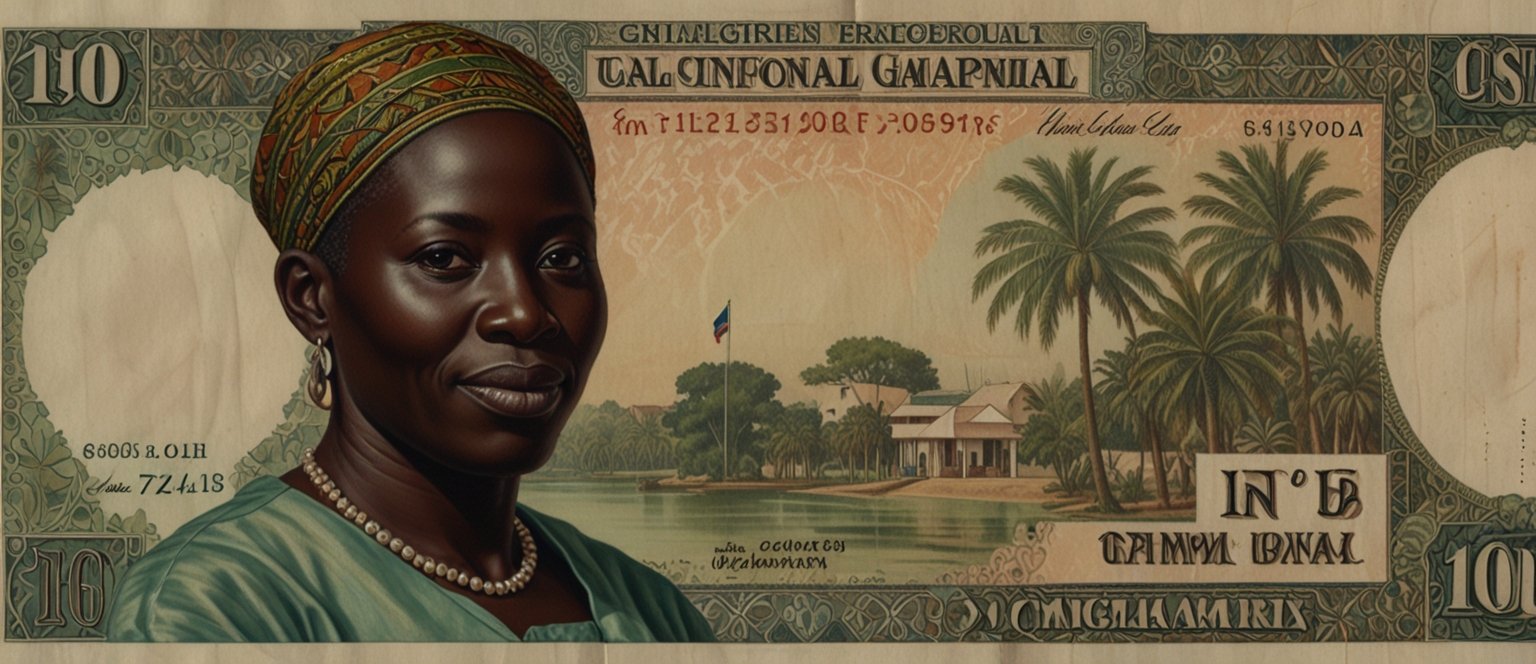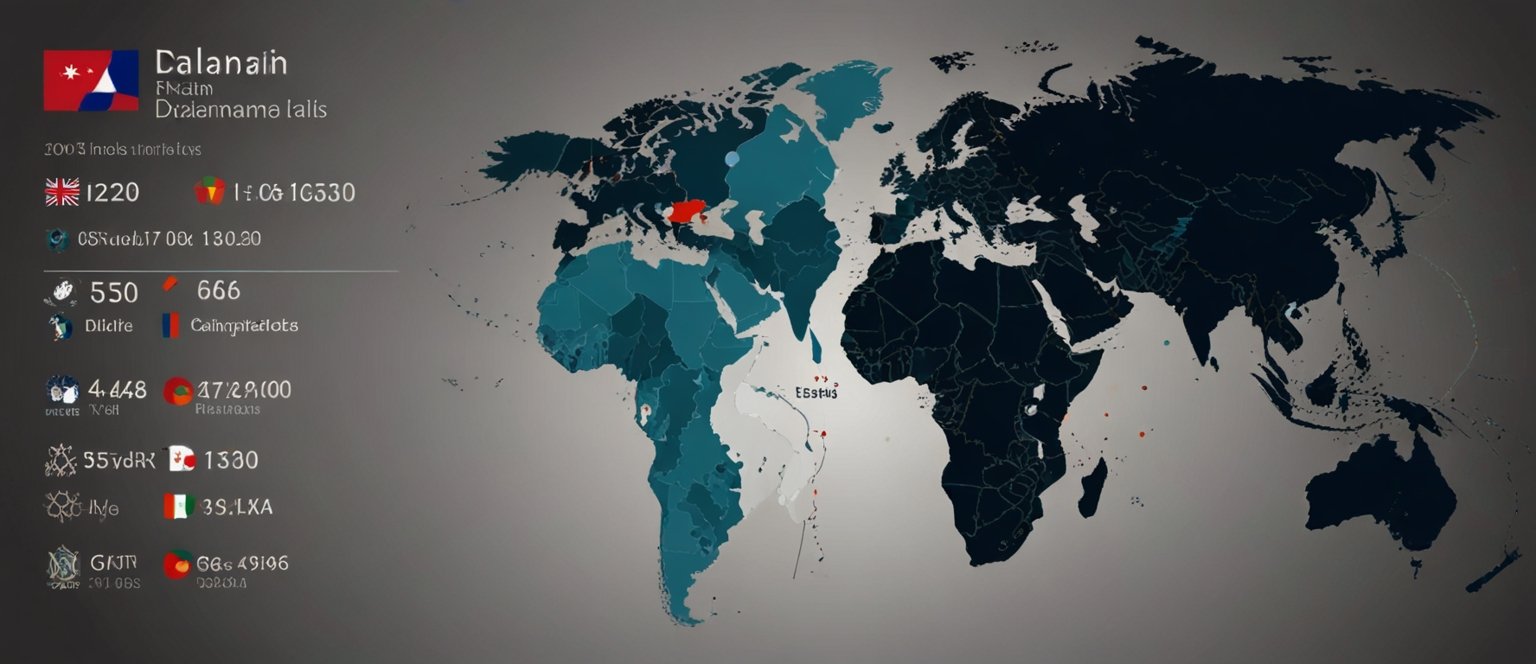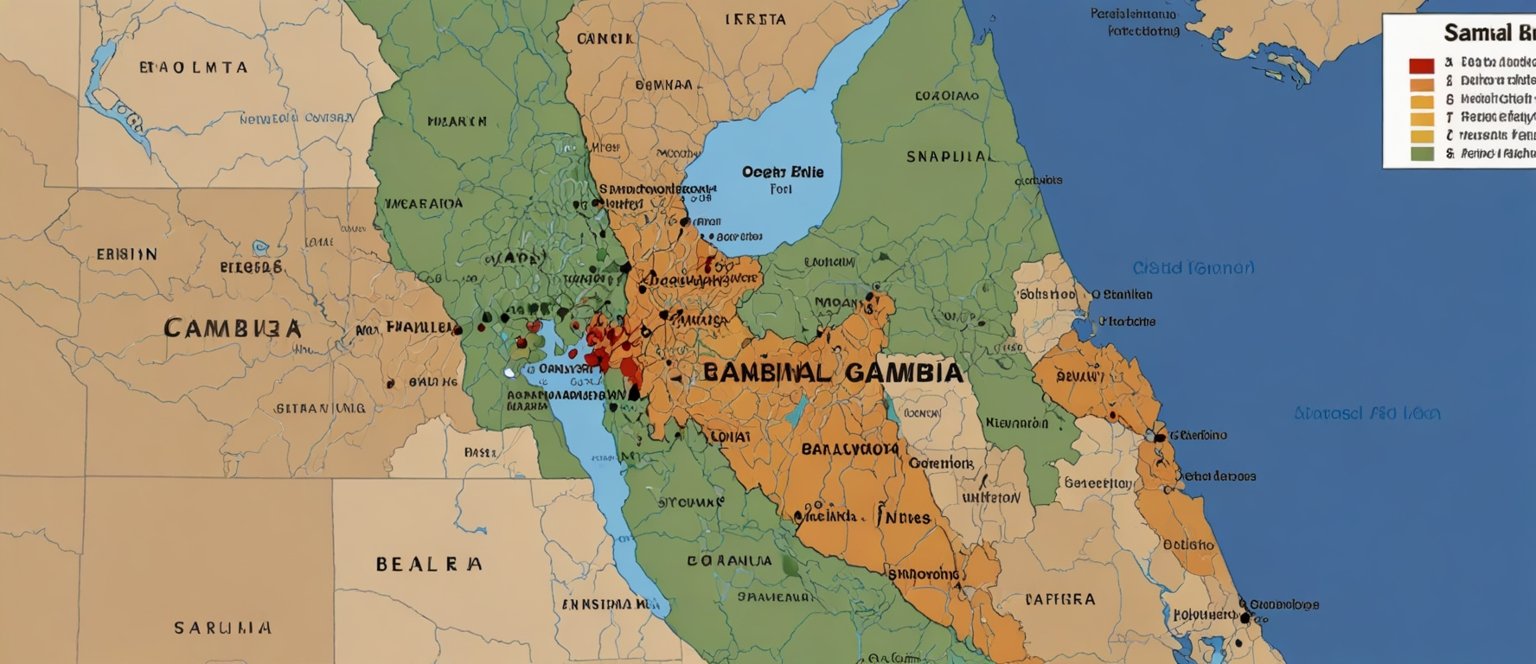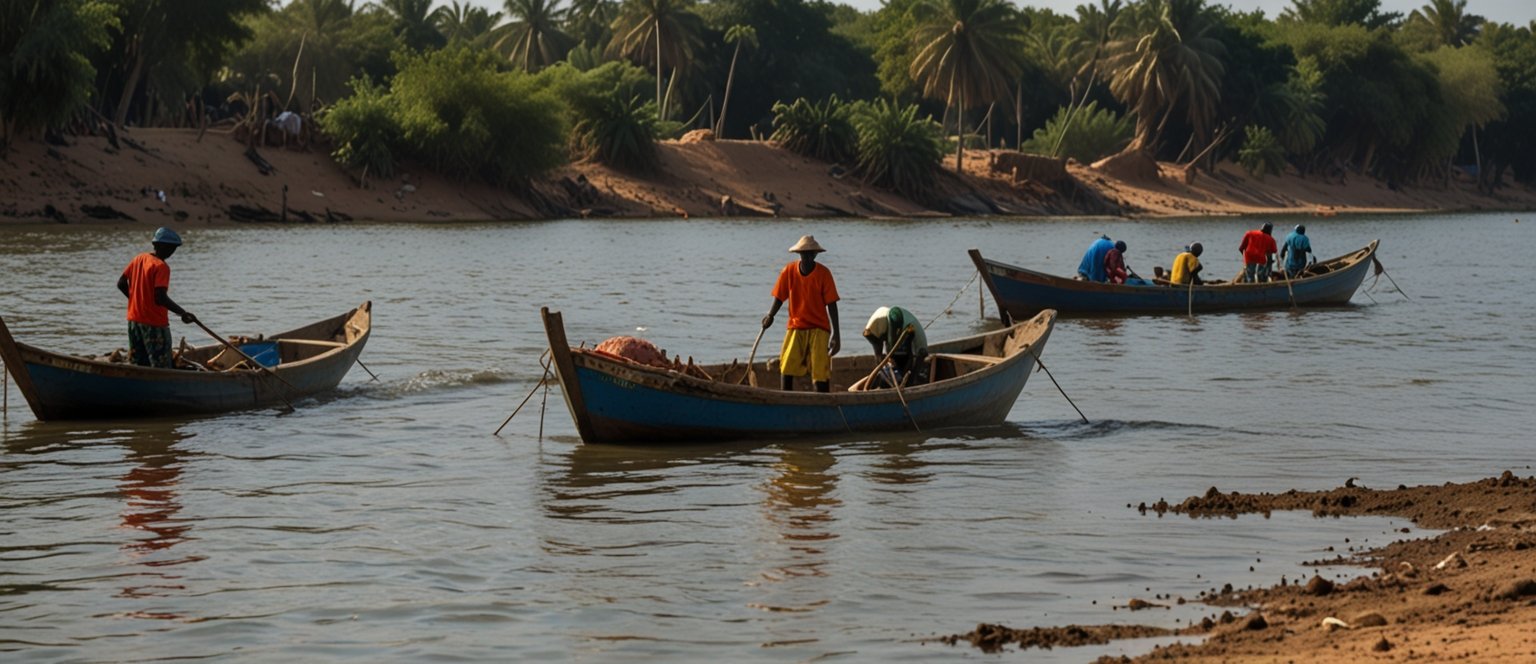Customary Economy of The Gambia

The Gambia, a little West African nation, is depicted by its rich social inheritance, agrarian roots, and a predominantly standard money related plan.
A standard economy is one that relies upon customs, customs, and the total experiences of an overall population went down through ages. The Gambia’s traditional economy, while bit by bit consolidating present day monetary practices, still enthusiastically relies upon agribusiness, fishing, and restricted scope trading.
This article plunges into the various highlights of The Gambia’s standard economy, examining its key regions, challenges, and the social components that continue to influence its money related development.
1. Framework of The Gambia‘s Standard Economy

The Gambia’s standard economy is generally agrarian, with commonplace organizations relying upon implies developing and fishing to help themselves.
This sort of economy is depicted by the exchanging of work and items considering deal structures, but monetary exchange is ending up being more normal.
The lazy speed of industrialization and limited permission to mechanical types of progress suggests that various Gambians really take part in customary monetary activities as a fundamental wellspring of work.
1.1 Bona fide Setting of The Gambia’s Economy
All around, The Gambia’s economy has been eagerly connected to its generally expected resources and geographical region along the Gambia Stream, which has worked with trade. Before pioneer influences, the economy relied upon the production of rustic product, fishing, and neighborhood makes, with trade drove through exchange structures.
The introduction of cash crops during the boondocks time span, similar to peanuts, began to move the money related development, but various ordinary practices really remain.
1.1.1 Pre-Common Economy
Before European colonization, The Gambia was fundamental for various spaces and domains, including the Mali and Songhai Areas.
The economy during this time relied upon agribusiness, dairy steers swarming, and fishing.
Networks partook in area and regional trade, much of the time exchanging plant produce, creatures, and claims to fame. Exchange systems overpowered, and cash was just once in a while used in country districts.
Agrarian practices were by and large standard, using essential instruments and techniques went down through ages.
1.1.2 Impact of Government
The presence of European powers, particularly the English, altogether impacted The Gambia’s standard economy. The English introduced cash crops, particularly peanuts (groundnuts), which transformed into the country’s fundamental item.
This irrefutable the beginning of a shift from essentially asset developing to business agriculture, but customary developing methodologies continued to overpower.
Dominion in like manner introduced formal monetary structures, but these were deferred to enter rural organizations where deal remained typical.
2. Key Region of The Gambia’s Customary Economy

The Gambia’s customary economy twirls around three key regions: agriculture, fishing, and restricted scope trade.
These regions have been the underpinning of the economy for a seriously significant time-frame, supporting the employments of the greater part of the general population, particularly in common locales.
2.1 Agribusiness
Agribusiness is the underpinning of The Gambia’s ordinary economy, using around 70% of the general population.
Most developing activities are asset based, suggesting that families foster harvests essentially for their own usage, with any abundance sold in adjacent business areas. The chief yields integrate millet, maize, sorghum, and groundnuts, with groundnuts being the fundamental cash crop introduced during the outskirts time.
2.1.1 Customary Developing Practices
Customary developing techniques in The Gambia rely upon troublesome work and fundamental gadgets, similar to scrubbers and cutlasses.
These procedures have been gone down through ages, with confined use of present day advancement like homestead vehicles or water framework structures. Farmers every now and again follow a plan of yield turn and moving advancement to stay aware of soil productivity.
Regardless, climate change and land degradation present colossal troubles to agricultural proficiency.
2.1.2 Occupation of Women in Cultivating
Women expect a critical part in The Gambia’s regular plant region. They are essentially responsible for creating food crops, similar to vegetables and grains, while men will frequently focus in on cash crops like groundnuts.
Women’s cultivating practices are essential for family food security, and their responsibilities to neighborhood markets through the proposal of overabundance produce are a critical piece of the rural economy.
2.2 Fishing
Fishing is another fundamental piece of The Gambia’s standard economy, particularly for networks living along the coast and the Gambia Stream.
Both stream and marine fishing have been cleaned for a seriously prolonged stretch of time, with fish filling in as an imperative wellspring of protein in the Gambian eating routine.
Fishing strategies are by and large particular, with fishermen using minimal wooden boats (pirogues) and direct nets to get fish for usage and arrangement.
2.2.1 Standard Fishing Strategies
Standard fishing in The Gambia relies upon major methodology that have remained commonly unaltered for a very long time.
Fishers use nets, lines, and traps created utilizing neighborhood materials to get a combination of fish, including tilapia, catfish, and barracuda.
Fishing is much of the time done approach shore or in the stream, with greater gets sold in neighborhood exhibits or smoked and dried for protection.
2.2.2 Challenges Facing the Fishing Region
Despite its importance, the ordinary fishing region in The Gambia faces a couple of troubles.
Overfishing, driven by both area and new fishing task forces, has provoked a diminishing in fish stocks. Additionally, ecological change and regular defilement, similar to mangrove deforestation, have unfavorably impacted fish living spaces.
Great fishermen need induction to current equipment and planning, limiting their ability to fight with present day fishing exercises.
2.3 Restricted scope Trade and Craftsmanship
Restricted scope trade is a fundamental piece of The Gambia’s standard economy, with neighborhood markets expecting a central part in the exchanging of work and items.
Most trade is coordinated inside commonplace organizations, where people sell cultivating produce, fish, and painstakingly collected stock.
Standard works of art, such as twisting around, stoneware, and wood cutting, are furthermore critical monetary activities, particularly for rural craftsmans.
2.3.1 Occupation of Business areas in the Customary Economy
Markets are the focal point of monetary activity in common Gambia.
They give a space to farmers, fishermen, and craftsmans to sell their items and buy necessities. These business areas work on both a cash and exchange structure, but cash trades are ending up being more typical.
Market days are colossal social and money related events, joining people from various organizations.
2.3.2 Ordinary Craftsmanships and Their Financial Importance
Customary craftsmanships, similar to stoneware, twisting around, and wood cutting, are critical financial activities for the larger part country Gambians.
These fine arts are commonly conveyed using secretly got materials and sold in area markets or to
. While the interest for standard fine arts has declined lately, they stay a critical sort of income for some craftsmans, particularly women.
3. The Occupation of Social and Social Components in The Gambia’s Regular Economy

Social and social factors expect a colossal part in framing The Gambia’s traditional economy.
Monetary activities are oftentimes appended to family structures, aggregate work practices, and ordinary customs.
These components influence how resources are scattered, how work is composed, and the manner by which money related decisions are made.
3.1 Public Work and Resource Sharing
In rural Gambian social class, aggregate work practices are typical, particularly in cultivation.
Families and neighbors much of the time get together to work on each other’s estates, sharing work and resources for increase effectiveness.
This preparation, known as “nafa,” relies upon correspondence and shared help, reflecting solid areas for the ties that help standard money related structures.
3.2 Family and Direction Occupations in the Economy
Family structures expect a central part in The Gambia’s customary economy. Monetary activities are every now and again organized along direction lines, with individuals responsible for different endeavors.
Men usually revolve around cash crop developing and fishing, while women are obligated for food crop advancement and restricted scope trade.
These gendered divisions of work are deeply grounded in friendly norms and basically influence how financial activities are driven.
3.3 The Impact of Traditional Organization
Ordinary organization structures, similar to town get-togethers and older people, moreover influence the standard economy.
These trailblazers oftentimes expect a section in addressing issues with respect to region and resources, figuring out open work, and coordinating trade practices.
While formal government foundations have assumed control over an enormous number of these positions, customary organization stays critical in commonplace locales.
4. Natural Hardships Impacting
The Gambia’s Customary Economy The Gambia’s standard economy is anxiously associated with the climate, with agribusiness, fishing, and qualities depending upon conventional assets.
In any case, normal inconveniences, for example, natural change, deforestation, and land debasement present huge dangers to these customary financial exercises.
4.1 Regular Change and Its Effect on Developing
Regular change is in a general sense impacting The Gambia’s standard plant district. Expanded temperatures, changing precipitation models, and additional ceaseless dry spells are making it challenging for ranchers to encourage collects and remain mindful of food security.
Standard creating rehearses, which depend upon downpour managed developing, are especially weak against these changes, inducing diminished yields and expanded food deficiency.
4.2 Deforestation and Land Debasement
Deforestation and land corruption are critical standard difficulties in The Gambia.
The getting freed from backcountry for development and the abuse of land have incited soil disintegration and diminished soil efficiency.
These issues are especially perilous for typical associations that depend upon suggests creating, as they decline the land’s adequacy and damage the worthiness of standard creating rehearses.
4.3 Overfishing and Marine Debasement
The overfishing of the Gambia Stream and beach front waters, driven by both region and new fishing armadas, has incited a decrease in fish stocks.
This tends to a giant gamble to the occupations of normal fishers who depend upon these assets for food and pay.
Also, the debasement of marine spaces, like mangroves and coral reefs, is further empowering the issue, making it even more hard for fish masses to recuperate.
5. Financial Difficulties in The Gambia’s Standard Economy
Notwithstanding typical variables, financial difficulties correspondingly shape the standard economy of The Gambia.
Despondency, bound framework, nonattendance of authorization to getting ready, and thriving associations make essential blocks for normal associations attempting to help standard money related exercises.
These difficulties quite a bit of beyond what many would consider possible cash related movability and keep an illustration of reliance on suggests creating and fishing.
5.1 Dejection and Restricted Money related Extending
A tremendous test in The Gambia’s standard economy is unbelievable neediness. Different families depend just upon infers agribusiness and looking for their occupations, essentially blocking pay improvement.
This dependence on conventional districts makes country networks feeble against money related shocks, for example, dreadful collects or declining fish stocks. With restricted current or business progress in country locale, chances to move past standard practices are meager.
5.1.1 Lacking Consent to Cash related Associations
One of the fundamental purposes behind the shortage of growing in country economies is the bound authorization to cash related associations.
Different Gambians in regular districts don’t push toward credit, banking, or security, which could assist them with setting resources into new financial exercises or modernize their green and fishing rehearses.
Without these monetary contraptions, conventional associations are regularly trapped in instances of disheartening, dependent upon low-yield creating or fishing to determine basic issues.
5.2 Foundation and Market Access
Another test opposing The Gambia’s standard economy is horrendous foundation. Different country regions need legitimate streets, dependable power, and enlistment to clean water. This makes it inciting for ranchers and anglers to move their item to business regions, particularly those organized in metropolitan spots.
The setback of design besides upsets enlistment to direction and clinical advantages, the two of which are key for breaking the case of urgency and working on the ampleness of customary cash related practices.
5.3 Direction and Ability Movement
A setback of consent to quality direction is another main pressing concern restricting the headway of The Gambia’s conventional economy.
Country social class once in a while have lower capacity rates, and enlightening foundation here is underfunded and understaffed.
This hinders the restriction of people to obtain new limits that could be useful to them modernize standard creating or fishing techniques, adopt on better fundamental strategies, or seek after new monetary doorways.
5.4 Thriving Difficulties and Financial Viability
Clinical issues, including weakened prosperity, wild fever, and other preventable afflictions, essentially influence the efficiency of normal associations in The Gambia.
Determined delicacy decreases the restriction of people to participate in standard financial exercises like creating and fishing, in this way keeping family pay and food security.
Moreover, the deficit of authorization to clinical advantages in country regions crumbles these issues, as individuals can’t search for the treatment they need to remain mindful of their monetary result.
End
The Gambia’s standard economy, grounded in agribusiness and fishing, is essentially associated with the country’s social legacy and typical living space. While it offers a reasonable lifestyle for by a wide margin most typical associations, it faces various difficulties.
Natural corruption, biological change, and restricted acceptance to present day framework and monetary associations all block its new development.
Additionally, financial difficulties like urgency, sad mentoring, and insufficient clinical advantages further frustrate what’s happening. Regardless of what these issues, The Gambia’s standard economy holds the potential for improvement, particularly through the mix of current procedures that regard social practices.
By looking out for these difficulties and utilizing outside help really, The Gambia can manage the positions of its country networks while setting aside its standard cash related establishment.
FAQs
1. What is a standard economy?
A standard economy is one that is fundamentally settled on resource creating, fishing, and exchange inside adjoining associations.
It is, generally speaking, formed by agreeable practices and depends upon common assets.
2. How basic is developing in The Gambia’s standard economy?
Farming is a supporting of The Gambia’s standard economy, with most typical families depending after creating to give food and pay. Yields, for example, peanuts and rice are critical to supporting position.
3. What difficulties do ranchers in The Gambia face?
Ranchers in The Gambia face various difficulties, including organic degradation, disastrous soil efficiency, whimsical air conditions, and a setback of current creating contraptions and methods.
4. How does fishing add to The Gambia’s standard economy?
Fishing anticipates a key part in The Gambia’s standard economy, particularly for networks living along the coast and streams. Fish is both a wellspring of protein for neighborhood people and a thing for exchange.
5. What are the basic harvests filled in The Gambia?
Colossal yields filled in The Gambia unite groundnuts (peanuts), rice, millet, maize, and sorghum. Groundnuts, expressly, are a pivotal money crop for trade.
6. How has regular change affected The Gambia’s standard economy?
Natural change has incited more typical dry spells, whimsical precipitation, and climbing temperatures, all of which have harmed developing capability and fishing yields in The Gambia.
7. Which occupation does standard information play in the economy?
Conventional information is essential in The Gambia’s economy, as it wraps creating techniques, fishing strategies, and craftsmanship went down through ages, guaranteeing the reasonableness of these practices.
8. What are the money related difficulties of The Gambia’s standard economy?
Money related difficulties solidify wide downfall, shocking framework, restricted authorization to mentoring and monetary associations, and lacking clinical advantages in country districts.
9. How does miserable foundation influence standard ranchers and fishermen?
Miserable design, for example, a shortage of streets and transportation, makes it hard for ranchers and fishers to get to business regions, accomplishing lower pay and less financial flexibility.
10. Is there any cutting edge mediation in The Gambia’s standard economy?
Beyond a shadow of a doubt, there are drives featured modernizing the standard economy by presenting better creating strategies, water structure frameworks, and consent to microfinance, however these are an enormous piece of the time bound in scope.
11. How do outside factors impact The Gambia’s standard economy?
Outside components, for example, in general market plans, new assistant, and movement can overall impact The Gambia’s customary economy, either giving entrances to movement or making inconveniences.
12. How does improvement influence the standard economy in The Gambia?
Development, particularly of youngsters to metropolitan regions or abroad, reduces the normal workforce, affecting nation and fishing efficiency in the standard economy.
13. What is the fate of The Gambia’s conventional economy?
The unavoidable predetermination of The Gambia’s conventional economy relies on its capacity to orchestrate current procedures, address typical difficulties, and further encourage enlistment to direction, cash related associations, and clinical thought, while remaining mindful of regard for social practices.
